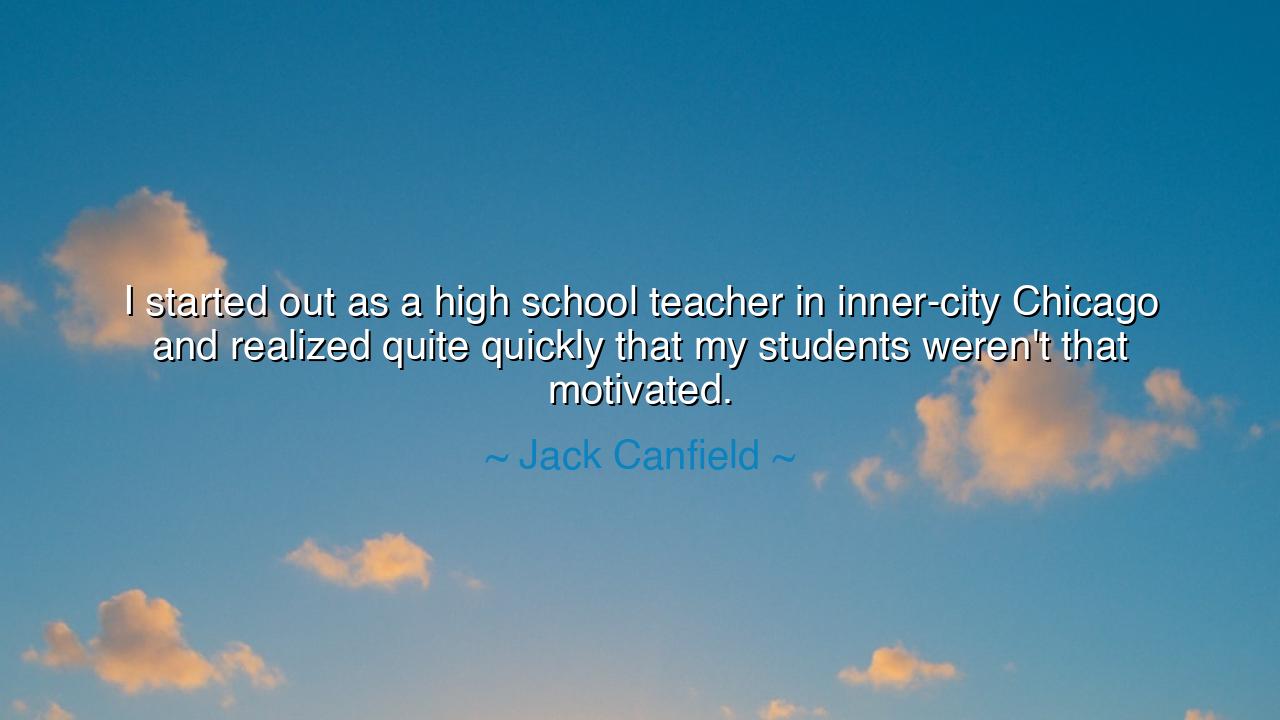
I started out as a high school teacher in inner-city Chicago and
I started out as a high school teacher in inner-city Chicago and realized quite quickly that my students weren't that motivated.






Jack Canfield, the teacher who became a guide to millions through Chicken Soup for the Soul, once confessed: “I started out as a high school teacher in inner-city Chicago and realized quite quickly that my students weren’t that motivated.” These words are not spoken in bitterness, but in revelation. For in them lies the beginning of his journey: the awakening that knowledge alone is not enough, that the soul must first be stirred, the heart first be lit, before the mind will receive. It is a truth as old as the sages—that without motivation, learning lies dormant, like seed scattered on stone.
The origin of this insight lies in Canfield’s early years as an educator. Fresh from his own studies, filled with ideals and determination, he entered classrooms where the young did not hunger for learning. He saw before him not eager disciples, but weary spirits, dulled by hardship and disbelief in their own potential. This moment was his trial by fire. He might have despaired and resigned himself to failure, but instead he sought to understand: how does one awaken the sleeping spirit? How does one breathe hope into hearts that no longer believe in tomorrow? Out of this question would rise the foundation of his life’s work.
History itself has witnessed such struggles. Think of Socrates in the marketplace of Athens, who faced not scholars but common citizens, many indifferent, even hostile, to philosophy. Yet Socrates did not despair. He questioned, he provoked, he drew forth the hidden wisdom in others, often against their will. His task was not to fill empty vessels, but to stir stagnant waters into motion. Just as Socrates awakened the Athenians, so Canfield sought to awaken his students—not by scolding their lack of motivation, but by igniting within them a vision of possibility.
The meaning of Canfield’s words is both heroic and tender. He saw that the greatest challenge of teaching was not the transmission of facts, but the awakening of belief. For what is knowledge to one who does not think himself worthy of it? What is opportunity to one who does not believe he can grasp it? The true teacher, therefore, is not merely an instructor but a flame-bearer, carrying light into the darkness of despair. Canfield discovered that if he could inspire his students to believe in themselves, the thirst for knowledge would follow.
This truth extends beyond the classroom. In every realm of life—whether in the workplace, the family, or the self—the battle is the same. Skills, tools, and opportunities abound, but without motivation, they lie unused. A man may have books but never read them, strength but never train it, dreams but never pursue them. What he lacks is not ability, but the fire to begin. Thus Canfield’s early discovery became a universal teaching: to change lives, one must first awaken the inner flame.
The lesson for us is clear: do not only seek knowledge, seek also the fuel that will drive it. And when you guide others, remember that encouragement is as vital as instruction. If you lead, speak not only of what must be done, but of why it matters and why they are capable of doing it. Cultivate belief, for belief is the root of action. Motivation, once kindled, makes all learning possible.
Practically, this means: take time each day to inspire yourself. Write down your goals, remind yourself of your worth, and surround yourself with examples of those who overcame doubt. If you are a parent, mentor, or teacher, speak words of possibility into the ears of those who struggle. Say, “You can,” until they begin to believe it. For once the flame of motivation is lit, no force can easily extinguish it, and from that fire will rise knowledge, action, and transformation.
Thus, Canfield’s words endure not as lament, but as calling. He began among unmotivated students, but he became a teacher of the world. From this we learn: do not despair when you find hearts cold and weary. Rather, become the fire that warms them. For to awaken belief is to awaken life itself, and to awaken life is the noblest task a soul can undertake.






AAdministratorAdministrator
Welcome, honored guests. Please leave a comment, we will respond soon